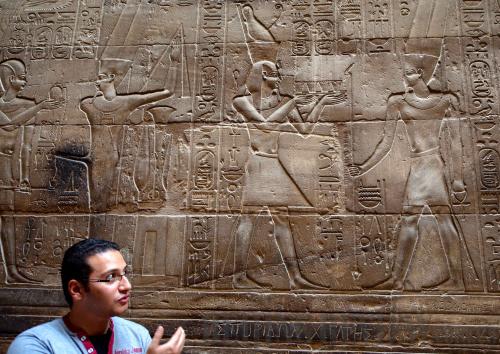|
 |
|
RESTORED: An Egyptian visits the stone relief in the Luxor Temple on May 27 after "Ding Jinhao was here" had been removed. The act of vandalism elicited a fierce rebuke from netizens and initiated a discussion of proper tourist etiquette (LI MUZI) |
Among the ancient hieroglyphics at Egypt's Luxor Temple is altogether different kind of inscription: "Ding Jinhao was here," etched into the surface of the 3,500-year-old stone relief in Chinese characters.
Chinese traveler Shen Yuwen, embarrassed by the apparent act of vandalism by one of his countrymen, said that he tried to wipe away the seven-character inscription with a napkin when visiting the site on May 6. He shared a photograph of the graffiti in his microblog on May 24.
Although Shen's efforts were not able to save the surface of the stone relief, there is hope that his gesture might save face for Chinese tourists, with a little help from netizens.
In the following five days, netizens left more than 270,000 comments to Shen's post, mostly condemning the vandalism. Some even flesh searched the vandal, identifying him as a 15-year-old middle school student in Nanjing, east China's Jiangsu Province. Hackers mockingly defaced the website of his former primary school with a "Ding Jinhao was here" of their own.
The overwhelming outrage eventually elicited an apology from the boy's parents. Nevertheless, the event opened discussion of the etiquette and decorum of growing numbers of Chinese tourists visiting abroad.
Bad manners
In addition to the Ding Jinhao scandal, netizens also reposted evidence of a grotto painting dating back to the Western Xia Dynasty (1038-1227) having been tagged by a tourist in 2000.
On May 27, cultural heritage authorities of Guazhou County, northwest China's Gansu Province, made a public apology for poor management that permitted the vandalism.
The tourist, then a reporter for Hong Kong-based newspaper Wen Wei Po, scrawled the graffiti with an ink pen while his guide, a local archaeologist, wasn't looking.
In March 2009, a retiree from Changzhou, east China's Jiangsu Province, carved his name and hometown on a rock in Taiwan's Yehliu Geopark, triggering intense criticism.
In February, a photo showing the Chinese characters reading "Liang Qiqi was here" carved by a tourist into a ceremonial brass receptacle at Beijing's Palace Museum, otherwise known as the Forbidden City, also quickly went viral.
"Objectively speaking, our tourists are characteristically uncivilized. Especially, when they travel overseas, which is regarded as a new luxury they often compare with each other and want to show off," said Liu Simin, a researcher with the Tourism Research Center under the Chinese Academy of Social Sciences.
Along with its rapid economic growth, China's tourism industry is growing fast. In little more than a decade, Chinese tourists have gone from being relatively rare outside of Asia to the most important market for global tourism.
In 2012, more than 83 million Chinese tourists travelled overseas, compared to 10 million in 2000, and spending on travel abroad reached $102 billion, the highest in the world, according to the United Nations World Tourism Organization.
By 2020, about 200 million Chinese are expected to take an overseas holiday every year.
However, the booming industry has also brought about an unsightly side effect: The country's international image is tarnished by the vulgar, impolite and undisciplined behavior of its citizens.
In March 2012, travel marketing institute Mandala Research released a report showing that the Chinese are the second worst tourists in the world following Americans.
During the Chinese Lunar New Year holiday in February, Bangkok news daily The Nation published letters from readers grumbling about Chinese tourists' annoying behavior.
One Thai wrote, "Chinese tourists are too boisterous. They tend to drive fast on the wrong side of the road, and often go against traffic on one-way streets."
| 